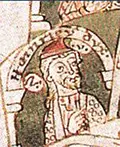Henry the Lion: Duke of Bavaria and Saxony
Henry the Lion was Duke of Bavaria and Duke of Saxony for a time in the 12th Century. A fierce fighter, he won many battles and also made some powerful allies and enemies. 
He was born in 1129 in Ravensburg. His father was Henry the Proud, and his mother was Gertrude of Süpplingenburg. His father was Duke of Bavaria and Duke of Saxony and had come from the dynastic family the Billungs, who had ruled as dukes of Saxony. His mother's father was the reigning Holy Roman Emperor, Lothair III. The German King Conrad III had, after a dispute, removed Henry the Proud as duke of both Bavaria and Saxony, giving the former to Leopold of Austria and the latter to Albert the Bear. Thus, when Henry the Proud died, in 1139, his son Henry had no titles to inherit. The German king returned Saxony to young Henry in 1142. The advent of a new emperor, Frederick Barbarossa, brought about some changes in policy and preference. One of those was the return of Bavaria to Henry, in 1156. 
Emperor and duke had the occasional disagreements. One of those was in Henry's choice of wife. He had married Clementia of Zähringen in 1147, and they had had three children, only Gertrude of whom lived into adulthood. In 1162, however, Emperor Frederick decreed that Henry divorce his wife; the duke did so, taking up the emperor's offer of more land and titles in return. Henry married again six years later, to Matilda, daughter of England's King Henry II and Eleanor of Aquitaine. Henry and Matilda had four children, three of whom lived into adulthood: Matilda (1172), Henry (1173), Otto (1175), and William (1184). Henry lived up to his famous moniker through fighting and winning battles. He fought with imperial forces in the Wendish Crusade, a campaign against the Slavic tribes in what is now Poland and northeast Germany. He marched with Barbarossa on campaign into Italy in 1154, then into Poland in 1157, and then back into Italy to fight at Crema and Milan, in 1160–1161, helping Barbarossa win both. At home, Henry actively expanded his holdings, founding new towns and encouraging new growth. He founded Munich, refounded Lübeck, developed Augsburg, and built up Schwerin. For his capital, he settled on Brunswick. In 1172, Henry went to Constantinople and other points east, meeting with both the Knights Templar and the Knights Hospitaller. He had no taste for a new war, however, and refused the emperor's call for support in an invasion of Lombary in 1174. Barbarossa's anger culminated in having Henry tried as an outlaw and taking away his hands, in 1180. Further, the emperor marched at the head of an army into Saxony and humiliated Henry, making him submit as a defeated malcontent. Barbarossa exiled Henry, sending him to Normandy, where he stayed for several years. Henry took his chance when the emperor embarked on the Third Crusade and, returning to Saxony, raised an army and conquered the prize possession of the city of Bardowick. That action earned the enmity of Barbarossa's son, Henry VI (who took over when his father died on Crusade), and the two Henrys met in battle. Henry the Lion admitted defeat and agreed to live in peace in Brunswick. He died there on Aug. 6, 1195. |
|
Social Studies for Kids
copyright 2002–2024
David White




